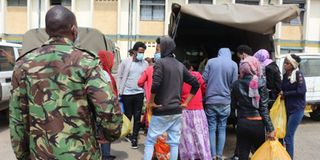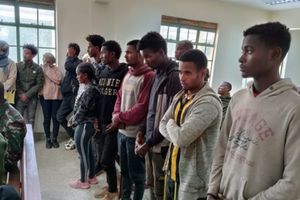
Some of the 23 Eritreans who were arrested in Opiroi, Samburu County, on July 6, 2021 for being in Kenya illegally.
The escape of Collins Jumaisi Khalusha, the prime suspect in the Kware murders, who allegedly confessed to killing 42 women, in the company of 12 Eritrean nationals arrested for being in Kenya illegally, has exposed a number of such cases of foreign nationals arrested in Kenya for not having the right documents, and their numbers are growing.
An analysis by Nation Research showed that in the last year alone, at least 639 Eritrean and Ethiopian nationals were arrested in different parts of Kenya, with experts now raising questions about the trend and what it means for the integrity of Kenya's borders, as well as its possible emergence as a transit zone for other countries or for human trafficking offences.
Currently, detectives from the Directorate of Criminal Investigations (DCI) are still pursuing Mr Jumaisi and the 13 Eritrean nationals.
The State has promised to reward anyone who provides information about Mr Jumaisi's whereabouts.
“A significant cash reward will be provided to anyone with credible information leading to the suspect's arrest. He hails from Shiru Sub-location, Shaviringa Location, Hamisi Sub-county, Vihiga County," the DCI said in a statement.
Nation.Africa looked into some of the incidents where aliens have escaped lawful custody, those who have been arrested and those that have been deported from the country for being here illegally.
Some of the aliens are victims of a well-coordinated international human smuggling organisation that operates in the underworld and is responsible for the trafficking of human beings.
The fact that some of the aliens are usually arrested within Nairobi raises questions of how they manage to travel all the way from Moyale without being noticed by passing several roadblocks as they head to the city.
Equally, the fact that we have several incidents of the aliens escaping lawful custody also raises the question on whether rogue police officers assist them to flee police stations.
In the Gigiri case, acting Inspector General of Police Gilbert Masengeli said that they had received information that it was an inside job which led to the interdiction of eight police officers.
“Our preliminary investigations indicate that the escape was aided by insiders, considering that officers were deployed accordingly to guard the station. Consequently, I have interdicted eight officers who were on duty last night,” Mr Masengeli said.
Some officers based on various police stations told Nation.Africa that the majority of incidents where aliens escape lawful custody is an inside job.
One of the highest profile cases that attracted the attention of not only local authorities but international as well is the extradition of John Habeta, 53, who is a Dutchman with an Eritrean descent.
He was wanted by Interpol for allegedly smuggling dozens of men, women and children to Europe.
He was also wanted by the Netherlands and after his arrest in Kenya he was taken into custody at Schiphol International airport in Amsterdam.

Eritrean nationals boarding a police vehicle after appearing before a court in Lodwar for being the country illegally.
Kenyan Police arrested John Habeta in Nairobi on 16 December as part of a sting operation coordinated between authorities in the Netherlands and Kenya with the support of Interpol’s General Secretariat headquarters.
In September 2023, an Ethiopian national was sentenced to 31 years in prison for trafficking 12 fellow Ethiopian nationals.
Mr Yibekal Gatachew alias Adinan Mohamed Galano was sentenced following his arrest on November 3, 2021, in Ngumo Estate, Nairobi County.
On the day he was arrested, the 12 victims were found chained in a room and they confessed that they were being taken to South Africa.
Many more cases have mentioned South Africa as their final destination when they are arrested without papers, leading to the rainbow nation demanding for Kenya to introduce stricter terms for such cases.
Others, based on police reports, are destined for other countries other than South Africa, including Europe.
Nation reached out to the Eritrean and Ethiopian embassies in Nairobi but did not get any response.
The United Nations Office on Drugs and Crime (UNODC) describes Human trafficking and migrant smuggling as one of the world’s most shameful crimes which affects every region in the world.
Since Ethiopia is one of the countries that is largely affected, they recently passed a legislation against the two crimes. The new set of rules was a collaboration between the government and UNODC regional office in East Africa.
“The laws lay the foundations for better protection to trafficking victims and vulnerable migrants. For example, it has provisions that foresee assistance to them as well as the creation of a Victim Fund,” UNODC states.
UNODC states that what leads to this is the temptation of jobs and greener pastures abroad.
“Many migrants use smugglers for a trip where too many end up falling prey to trafficking. They face unimaginable hardships - from abductions, attacks, hunger and dehydration on route, to physical, sexual and psychological abuse, restriction of movements and denial of salaries at destination,” UNODC said in a statement.
Professor Mirjam van Reisen who is an expert on matters International Relation and works at Tilburg University told Justice Information that she has been studying the Eritrean human trafficking network since 2010 and that it is hard for such a group to operate minus the government knowing.
“The Eritrean Government is so tightly controlled. It would be hard for a criminal organisation to operate outside the knowledge or the consent of the government,” she said.
Mr Martin Mavenjina of the Kenya Human Rights Commission (KHRC) said that a number of things usually lead to victims of human trafficking being brought into the country.
He mentioned porous borders saying that so little was being done to ensure that people don’t gain entry into the country from neighboring nations.
Mr Mavenjina who is a seasoned Constitutional and Human Rights Lawyer also said that the number of police officers is not enough to deal with these challenges.
“We know that the number of police in Kenya is between 100,000 to 120,000 and Kenyans are at 60 million. Dealing with these challenges also proves to be a hard task,” he said.
He also spoke of corruption saying that on a number of occasions police officers have been accused of taking bribes and they assist in smuggling of people.
“Policies and law are also another issue. In as much as we have legal provisions enforcement is becoming a challenge,” he said.
He also said that as a country Kenya should have a way of dealing with local Kenyan agencies and that the law to guide the business should be clear.
In the analysis by the Nation on the specific cases, the biggest number of those arrested in one day are 82 Ethiopians who were arrested in August 2023 in Syokimau, Machakos.
They included the 71 male adults and minors arrested on August 26 alongside 11 others who presented themselves to the police the following day.
In December 2023, 68 Eritreans were arrested in Wajir while traveling to Nairobi and charged with illegal entry into Kenya.
Before then in October, 60 Eritrean nationals arrested and detained in Lodwar, Kenya, for illegal entry and were transferred to Kakuma Refugee Camp to be processed as asylum seekers.
In November 2023 alone, our analysis shows, 65 Ethiopian and Eritrean nationals were arrested in Nairobi, 49 of them in Komarock Estate as they allegedly waited for a smuggler to move them and in another house in Huruma where police were told that they were waiting to head to South Africa.
The other 16 were arrested in Turkana (Eritrean nationals), who included six minors who said they were being smuggled with the intention of reaching South Africa; and later six Ethiopians in Merti, Isiolo County, who police believed then were part of a human trafficking ring.
In Murang’a County, at least 26 Ethiopians were in September 2023 arersted, confined in an unfinished house, allegedly planning to head to South Africa.
In the same month in Nairobi, a businessman, Mohamed Isack, was charged with human trafficking after being found with 23 Ethiopian nationals in a house in Bahati Estate, Kamukunji.
The Ethiopians, who had no identification or travel documents, were discovered in a single room and were believed to be en route to Tanzania.
They were arrested and charged with being in Kenya illegally. The Ethiopians are scheduled to be deported after the legal process.
Other Eritrean and Ethiopian nationals illegally in Kenya have since been arrested in Muthara, Meru County, Taita Taveta, Kakamega, Turkana, 47 in Mombasa who were being transported in a truck allegedly intended for South Africa, 90 Ethiopian nationals in Kajiado in February 2024, also suspected to be heading to South Africa.
The latest arrest was on August 7 in Mlolongo, Machakos, and at the Jomo Kenyatta International Airport two days before then.
The South African government, concerned about Kenya being used as a conduit for smugglers, had, in a 2022 deal to allow visa-free stay for Kenyans in South Africa for 90 days, put a caveat that placed the responsibility on Kenya.
In the deal, each country will bear the cost of deporting their nationals caught overstaying.
This means that a Kenyan overstaying in South Africa or caught entering illegally will be returned at the cost of Nairobi.
These, officials believe, will mean the travel filters between the two countries will be stringent, sieving out illegal immigrants, criminal suspects and all those with no paperwork taking advantage of the system
“People who abuse the system…don’t deserve to be in South Africa, and they don’t deserve to be in Kenya,” President Ruto said in November 2022.
“This agreement will be implemented to ensure the bad elements that try to infiltrate our countries are dealt with firmly and decisively.”










